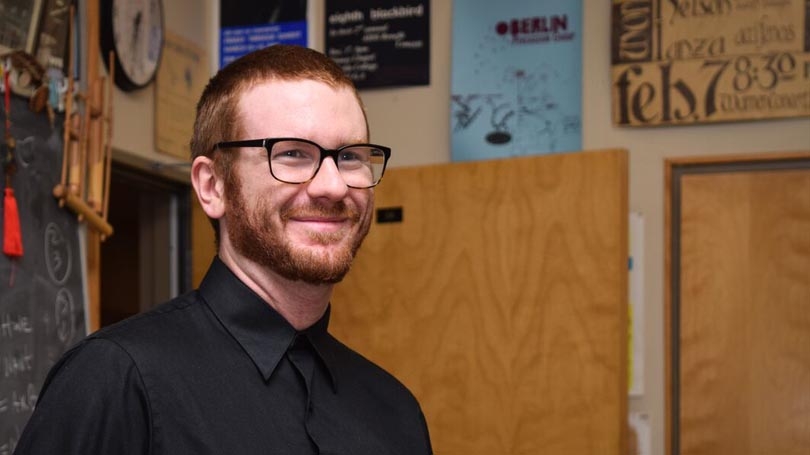
Hunter Brown used funds from the Graduate Alumni Research Award to perfect his music improvisation alogrithm (Photo: H. Brown)
Heretic: A New Live Algorithm
Improvisation has been a large part of my practice as a percussionist and composer, as well as the most difficult musical task I have ever faced. Perhaps improvisation’s mysterious and challenging nature is why it is my favorite mode of musical expression.
When I became interested in computer music and computer programming I thought that teaching computers how to improvise would be a fascinating project, and could perhaps assist in further lifting the veil over improvisation’s mysterious nature. Since computers can only do what they are told, they don’t have creative autonomy unless they are programmed to express autonomy. Learning how to teach a computer to improvise and to make autonomous decisions requires a deep musical understanding of how improvisation works in real-time, and how humans generate sequences of spontaneous decisions that constitute a complete improvised performance.
Finding this task a worthwhile challenge to better my musical growth, for my Master’s Thesis research I wrote a computer music software program, entitled Heretic, that can improvise with a human performer. Aside from the goal of deepening my ability as an improviser and musician, I was motivated to create an autonomous system that uses my own improvisational methodology as a conceptual framework for improvisation. Heretic is trained on my approach to improvisation, therefore Heretic’s own improvisational voice and modes of musical expression emerge through its interactions with a human performer.
Teaching Heretic to improvise with a human is analogous to common methodologies in improvisation pedagogy. The teacher provides the student with a musical tool-kit based on the teacher’s knowledge and experience. The student then uses this tool-kit to address their own needs in an improvisational context. This is how an improviser develops their own voice or sound—by learning what has come before them and interpreting this information through their own experiential lens.
As guitarist Joe Morris eloquently stated, "you can’t play what you don’t know." Heretic is not an instrument to be controlled by a performer; Heretic generates and controls its own musical output by listening to the present musical moment, interpreting what it hears, making a musical decision based on this information, and then sonically its decision. In regard to training Heretic, I provide the system with a methodology (or a tool-kit), and Heretic implements this methodology according to its own perception of the current musical context via machine learning techniques in the SuperCollider programing language and Wekinator software platform.
While implementing various machine learning methods to “teach” my improvisational “tool-kit” to Heretic, I realized that it was essential to first formalize my personal improvisational methodology. Since my primary means of improvisational expression is the drum-set, I realized that I must deeply study free improvisation from first-hand experience as a performer.
With generous support from the Alumni Research Award, I was able to spend the summer of 2018 partaking in performance research and improvisational drum-set lessons with the prolific jazz drummer Tomas Fujiwara in New York City. Having consistent feedback on the development of my improvisational language from an expert in this music enabled me to comprehensibly develop Heretic’s improvisational methodology. This study with Fujiwara provided a conceptual precedent to teach Heretic how to deeply and effectively interface with a human’s musical language Being in New York City also allowed me to attend concerts of freely improvised music, affording me the opportunity to speak with other practitioners of this music about my pursuit of formalizing my improvisational methodology.
Since the summer of 2018, I have continued to develop the Heretic software, and my own performance practice as a drummer. In this period of personal and academic growth, I have realized more and more how important my studies with Tomas Fujiwara were in developing the conceptual framework needed to create a functional and expressive computer music system. With the gracious gift of the Alumni Research Award, I have been able to achieve significant breakthroughs in the development of my Master’s Thesis project and my own intellectual evolution.
For recordings using the Heretic computer music system, please visit my website.